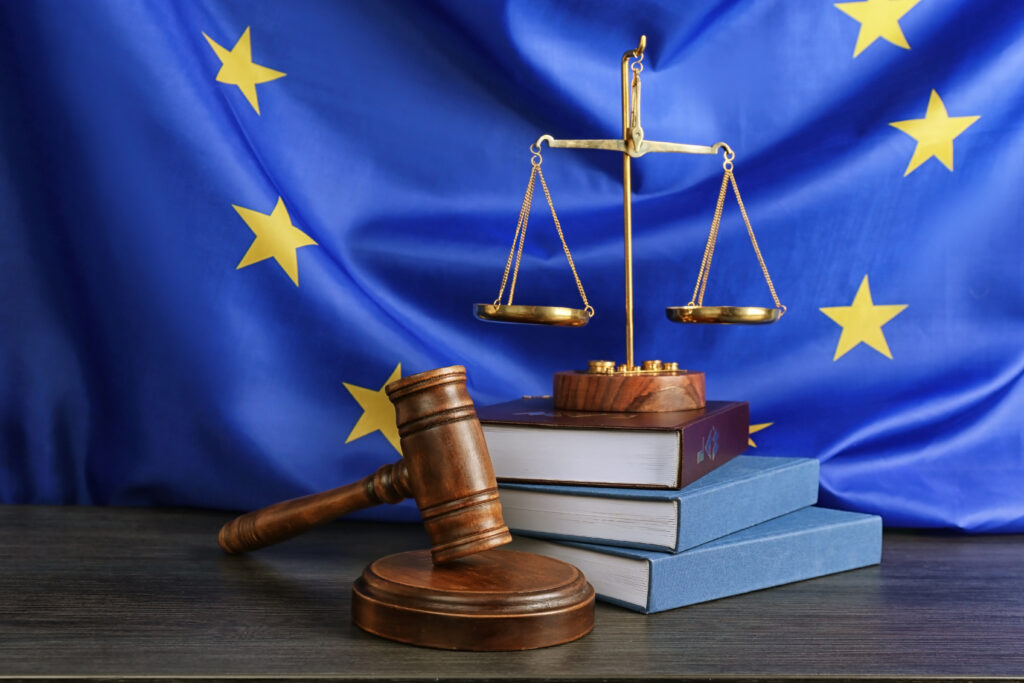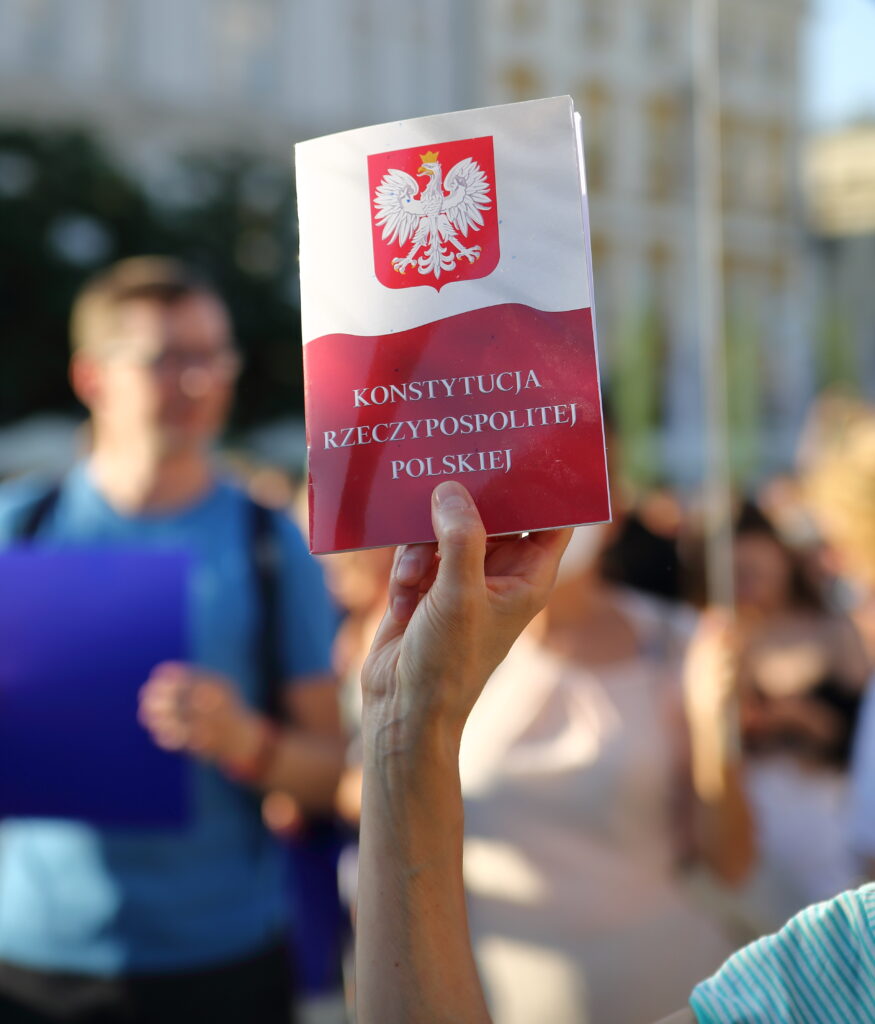Today’s Poland increasingly resembles the reality known from the times of the Polish People’s Republic, where the law was a tool of power rather than a limitation on it. Contrary to the provisions of the Polish Constitution, the actions of the current government undermine the independence of the courts, the legality of institutions and the will of the people, restoring the reality of the so-called ‘real constitution’ — unwritten and based solely on political power.
The rule of law according to the Polish Constitution
The Polish Constitution of 1997 contains two provisions on the rule of law, namely Article 2, which establishes the principle of a democratic state ruled by law, and Article 7, which introduces the principle of legality. From a formal point of view, it was not necessary to regulate the principle of the rule of law in this way. In a modern state, there is no doubt that the rule of law concerns both the formal aspect, i.e. the obligation of state authorities to act on the basis of the law and in accordance with its content, as regulated by Article 7, and that the content of the law should meet material conditions, as follows from Article 2. Therefore, in short, the law should be good, and thus fair. Experts supplement these two basic assumptions with so-called meta-norms. The idea is that everyone whose subjective right has been violated should have the legal possibility to assert their rights. The state should guarantee the functioning of the judiciary, whose task is to restore the law, i.e. to restore the condition of compliance with the law.
In classical Polish legal philosophy, we can read that the principle of the rule of law means that the law is good, and that the rule of law, understood in this way, should form the basis for the actions of state authorities. This is what we expected from the Republic of Poland when it was established in 1989 and when we took part in the elections to the Sejm and Senate on 4 June. These were not free elections, but they were a substitute for the opportunities that, for the first time since 1 September 1939, offered a chance for a sovereign Poland. That chance was seized at the time, although the further course of reforms did not guarantee quick results, let alone complete success. Today, it is clear how difficult the road we have travelled and how high the stakes are. If the government (in the statements of many of its prominent politicians, including Minister of Justice Adam Bodnar) takes actions that are completely contrary to the rule of law, by not recognising the legally appointed judges of the Supreme Court and questioning on this basis the competence of the Extraordinary Review and Public Affairs Chamber to recognise the validity of the presidential election, it means that not only does the rule of law not exist as a matter of fact, but also that those provisions of the Polish Constitution which require its implementation are rejected. This means that the Constitution of the Republic of Poland becomes fictitious, i.e. its provisions in the scope presented are not binding. However, the so-called real constitution is binding. It is an unwritten constitution, i.e. one that replaces the one formally adopted and approved in a constitutional referendum.
Tusk’s Poland like the Polish People’s Republic?
It can be said that history has come full circle and today, as in the period of the Polish People’s Republic, the Constitution is a fiction. This is confirmed by the hypocritical application by the government of the provisions of Article 187(1)(2) of the Constitution regulating the composition of the National Council of the Judiciary and the provisions of Article 324(1) and (2) of the Electoral Code concerning the validity of elections, the most recent example of which is the recognition of the validity of the resolution of the Supreme Court, sitting in full session of the Extraordinary Review and Public Affairs Chamber, confirming the validity of the supplementary elections to the Senate of the Republic of Poland held on 16 March 2025[1], as in this case the change in the composition of the National Council of the Judiciary made in 2017 does not violate the constitutional regulation. Although it would be rhetorical to ask why this is the case, it is nevertheless worth recalling that this is how ‘fighting democracy’ works. Political interests and the ability to use the means of coercion at its disposal are decisive.
There is no doubt that the composition of the National Council of the Judiciary is correctly regulated in the Act on the National Council of the Judiciary amended in 2017, and therefore the allegation of unconstitutionality is unfounded. Article 187(1)(1) and (2) stipulate that the National Council of the Judiciary shall consist of (in addition to the First President of the Supreme Court, the Minister of Justice, the President of the Supreme Administrative Court and a person appointed by the President of the Republic of Poland) 15 members elected from among judges of the Supreme Court, courts of general jurisdiction, administrative courts and military courts. The subject of the dispute is the manner of appointing the 15 judges. The Constitution clearly states that the selection is made ‘from among’ judges, not ‘by’ judges. Therefore, the amendment to the Act on the National Council of the Judiciary made in December 2017 by the United Right is consistent with the Constitution. The opposition during the United Right’s term in office claimed that the selection of these 15 judges must be carried out by judges, which is contrary to Article 187(1)(2) of the Constitution. In practice, selection by judges leads to an expansion of judicial power, which, not being subject to any external control, transforms into a specific type of judicial trade union. This phenomenon occurred not only in Poland, but also earlier in Spain, which also led to appropriate legislative changes. There are therefore no grounds for questioning the powers of the Extraordinary Review and Public Affairs Chamber of the Supreme Court to adopt a resolution on the validity of the 2025 presidential election.
Rejection of the will of the sovereign
At the same time, it should be noted that all actions taken by politicians of the ruling coalition on 13 December, including Prime Minister Donald Tusk and Minister of Justice Adam Bodnar, are clearly aimed at rejecting the will of the people, and the methods used are typical of authoritarian systems. I will refer to one of the proposed measures, namely the political coercion of President Andrzej Duda to withdraw his veto on an incidental bill providing for the establishment of a special court composed of Supreme Court judges, which, through its alleged apolitical nature, would guarantee the correct determination of the validity of the Polish presidential elections. The issue of this special court has already been discussed in detail, so at this point it is sufficient to ask what kind of new legal institution is the ‘withdrawal of a veto’ by the President of the Republic of Poland? In response, it suffices to say that the President is empowered to act on the basis of the law and within the limits of the law and, therefore, regardless of the substantive grounds, let alone political ones, without such a power, he cannot perform such an act. This would be an abuse of powers clearly set out in Article 126(3) of the Polish Constitution, which states that ‘the President of the Republic of Poland shall perform his duties within the scope and on the principles set out in the Constitution and in laws.’ The law no longer means anything in Poland!
Prof. Anna Łabno — constitutionalist, Tarnów Academy, member of the Scientific Council of Ordo Iuris
[1] Resolution of the entire Chamber of Extraordinary Control and Public Affairs of the Supreme Court of 14 May 2025 (ref. no. I NSW 3/25)
Image source: Adobe Stock.



